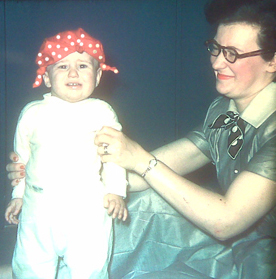 Post #7 – Women’s Memoirs, Rosie the Riveter – Matilda Butler and Kendra Bonnett
Post #7 – Women’s Memoirs, Rosie the Riveter – Matilda Butler and Kendra Bonnett
March is Women’s History Month, and Women’s Memoirs is celebrating.
But YOU get the gifts!
Because every woman needs to Rock the Dots this month, we’re giving away two, free Rosie the Riveter Legacy Bandanas with the purchase of our award-winning, collective memoir, Rosie’s Daughters: The “First Woman To” Generation Tells Its Story. This is a limited offer; get the details here.
************************************
This Friday, I want to thank a few of the women who have made my life the fabulous, opportunity-rich experience it is. But how to pick? So many strong, intelligent, artistic, empowered women have contributed to my life. I decided to make a personal list of the women I most respect and thank for paving the way:
Marie Curie…Dedication
Even though I majored in history and archaeology in college, I have always loved science, especially chemistry…it’s the math that stood in my way. So I will start my list with Marie Sklodowska Curie. Madame Curie is famous for her work in radioactivity. She discovered not one, but two new elements—polonium and radium. And she won not one, but two Nobel Prizes. During WWI, she was responsible for the creation of the mobile x-ray units used to help diagnose and treat soldiers in the field. She died in 1934, at the age of 66, of aplastic anemia—no doubt from her years of radiation exposure. Did you know that even today her personal papers, including her cookbook, are so highly radioactive that they can only be handled by someone wearing protective clothing and gear?
My father was a doctor, and when I was very young it was thought I might follow in his footsteps. Many Sundays, Daddy and I would enjoy a little ritual by starting our day over donuts and coffee (mine with sugar and lots of milk) at the Old Post Grill Diner on the Post Road in Greenwich. It was one of those art deco, shiny, steel-clad structures…long and narrow…and not much bigger than a train car. From there we headed to the hospital. He to do morning rounds and me to hang out at the nurses’ station. I carried a tiny doctor’s bag and usually practiced a little medicine on the nurses…handing out Band-aids, taping a bit of cotton to someone’s arm after I pretended to give a shot, and taking a few temperatures. I remember walking along a hospital corridor at my father’s side and hearing someone say, “There goes young Dr. Bonnett.”
Elizabeth Blackwell…Perseverence
My father, of course, doesn’t make my list of most respected women, but his influence is part of the reason that Elizabeth Blackwell most certainly qualifies: Quaker, suffragist, ardent anti-slavery advocate, teacher…and doctor of medicine. While she was not the first woman to study medicine by learning directly from a doctor, she wanted to attend medical school, which was unheard of for a woman in the mid-nineteenth century in the United States. Rejected by all the major medical schools in the country, she persevered and was finally accepted at Geneva Medical College in New York and graduated in 1849. She continued to blaze the trail, opening her own infirmary in New York, training nurses for the Union Army during the Civil War, and later establishing women’s medical colleges both in New York and London.
Fresh out of graduate school, I moved to San Francisco. That’s where I met Matilda Butler. Matilda, then running the Women’s Educational Equity Communication Network out of the Far West Laboratory for Educational Research and Development, became my first boss when she hired me as the program’s writer and editor. While Matilda and I were still at the Lab, microcomputers came on the scene. The year was 1979, and we became early adopters. I think we’ve lived on the bleeding edge of computer and Internet technology ever since.
Grace Hopper…Tireless Visionary
It’s no wonder, then, that Grace Hopper—“Amazing Grace”—makes my list. She was a true computer pioneer: She developed the first compiler for a computer programming language, which contributed to the development of COBOL; coined the term “bug” for computer glitches and popularized the task of debugging; and was among the first programmers of the Harvard Mark 1 mainframe computer. Hopper also served in the United States Navy from 1943 until 1986. She actually retired twice during that span (in 1966 and again in 1971) but was called back to active service…she was that indispensable. With her final retirement in 1986, Rear Admiral Hopper was awarded the Defense Distinguished Service Medal (highest non-combat award). But at 79 she didn’t retire from life; she became a senior consultant for Digital Equipment Corporation until her death in 1992 at the age of 85. The Navy honored her again in 1996 with the launch of a destroyer named USS Hopper.
I have one more woman on my list—a very special influence on my life. But to read about her, you’ll need to visit Story Circle Network’s One Woman’s Day blogsite.
Make your own list and celebrate your own empowerment
I hope you’ll take some time this month to think about the women who have helped to open doors, blaze trails, smash through glass ceilings and, as Matilda likes to say, leave a trail of breadcrumbs for the rest of us.
You’re part of this tradition. Let us GIVE you two, free Rosie the Riveter Legacy Bandanas so you can Rock the Dots that show the world you’re empowered.
Women’s History Month
Rosie’s Daughters
Rosie the Riveter
Rosie the Riveter Bandana


















